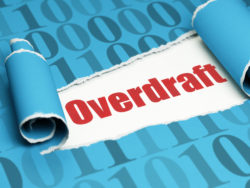 Bank overdraft practices continue to be in the spotlight after years of new regulations and overdraft fee lawsuits.
Bank overdraft practices continue to be in the spotlight after years of new regulations and overdraft fee lawsuits.
A new report by U.S. PIRG Education Fund found that overdraft fee revenues at major banks are on the upswing.
The report says over 600 large banks made $8.4 billion in overdraft fee income in the first three quarters of 2016 – an increase of almost four percent over the same period in the previous year.
The Fund’s study revealed that banks that rely the most on overdraft fee income also had more complaints filed with the Consumer Financial Protection Bureau in the category of “account funds being low.”
On the other hand, the report revealed that banks directly supervised by the CFPB tended to collect less overdraft revenue per account.
These banks tended to be those with $10 billion in assets or more, which qualifies them for direct CFPB supervision. The CFPB has been scrutinizing bank overdraft practices in particular over the past several years.
New regulations passed in 2010 prohibit banks from tacking overdraft fees onto ordinary debit card or ATM transactions unless the bank customer affirmatively opts into that service.
But reports of other potentially abusive practices have continued. Consumer advocates have called out banks for practices that appear to purposely increase their overdraft fee revenue.
For example, changing the order in which transactions are processed so that more transactions become subject to an overdraft fee, or failing to give customers meaningful notice about the terms of their overdraft services.
First Hawaiian Bank Overdraft Policies
Class action attorneys are now investigating the overdraft fee practices at several banks. One of the many banks falling within the scope of the current investigation is First Hawaiian Bank.
According to the bank’s website, First Hawaiian Bank overdraft services come standard with checking accounts. Other options are available at the customer’s choice. Under standard overdraft services, First Hawaiian may at its own discretion pay transactions that would otherwise overdraw the account.
This service comes with a per-transaction fee of $30, with an exception for transactions that overdraw the account by only $5 or less. If the account remains overdrawn at the end of the day for seven days, First Hawaiian will charge an additional fee of $10.
Standard overdraft service is limited to certain types of transactions including checks, automatic bill payments, and other kinds of transactions made using the account number.
Customers can affirmatively opt out of this service if they don’t want it, but the bank sets it up by default for each checking account.
First Hawaiian Bank overdraft service does not automatically apply to everyday debit card transactions or ATM transactions. To add coverage for those types of transactions, customers can opt into a program called DebitPlus.
First Hawaiian Bank Overdraft Protection is a different service. For customers who request and qualify for Overdraft Protection, the bank will automatically cover would-be overdrafts by transferring funds from either a linked savings account or a pre-approved line of credit.
Transfers made via Overdraft Protection can also be subject to an overdraft fee.
Do YOU have a legal claim? Fill out the form on this page now for a free, immediate, and confidential case evaluation. Some of the banks and credit unions being investigated include, but are not limited to:
- HSBC Bank
- UMB Bank
- State Employees Credit Union
- Pentagon Federal Credit Union
- Boeing Employees Credit Union
- Alliant Credit Union
- Star One Credit Union
- First Technology Federal Credit Union
- America First Credit Union
- American Airlines Federal Credit Union
- Alaska USA Federal Credit Union
- Vystar Credit Union
- Citizens Equity First Credit Union
- Teachers Federal Credit Union
- ESL Federal Credit Union
- Patelco Credit Union
- DFCU Financial Credit Union
The attorneys who work with Top Class Actions will contact you if you qualify to let you know if an individual lawsuit or class action lawsuit is best for you. Hurry — statutes of limitations may apply.
ATTORNEY ADVERTISING
Top Class Actions is a Proud Member of the American Bar Association
LEGAL INFORMATION IS NOT LEGAL ADVICE
Top Class Actions Legal Statement
©2008 – 2025 Top Class Actions® LLC
Various Trademarks held by their respective owners
This website is not intended for viewing or usage by European Union citizens.
Get Help – It’s Free
Join a Free Bank & Credit Union Overdraft Fee Class Action Lawsuit Investigation
If your bank and credit union has engaged in deceptive overdraft fee practices, you may have a legal claim. Fill out the form on this page now to find out if you qualify!
An attorney will contact you if you qualify to discuss the details of your potential case.
In order to properly investigate overdraft fee claims, you may be required to disclose bank statements to overdraft fee attorneys. Please note that any such information will be kept private and confidential.
ATTORNEY ADVERTISING
The choice of a lawyer is an important decision and should not be based solely on advertisements.
E-mail any problems with this form to [email protected]
PAID ATTORNEY ADVERTISEMENT: THIS WEB PAGE IS AN ADVERTISEMENT AND THE PARTICIPATING ATTORNEY(S) ARE INCLUDED BECAUSE THEY PAY AN ADVERTISING FEE. The attorney in charge of this advertisement is T.Kick. It is not a lawyer referral service or prepaid legal services plan. Top Class Actions is not a law firm. Top Class Actions does not endorse or recommend any lawyer or law firm who participates in the network, nor does it analyze a person’s legal situation when determining which participating lawyers receive a person’s inquiry. It does not make any representation and has not made any judgment as to the qualifications, expertise or credentials of any participating lawyer. No representation is made that the quality of the legal services to be performed is greater than the quality of legal services performed by other lawyers. The information contained herein is not legal advice. Any information you submit to Top Class Actions does not create an attorney-client relationship and may not be protected by attorney-client privilege. Do not use the form to submit confidential, time-sensitive, or privileged information. All photos are of models and do not depict clients. All case evaluations are performed by participating attorneys.












